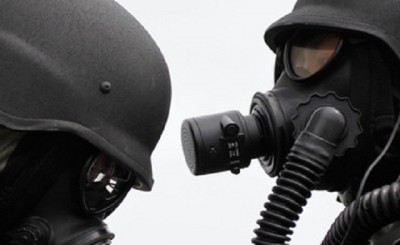Chemical Weapons and Media Disinformation: Venezuela’s President Maduro Accused of Using “Toxic Weapons” against Protesters

Chemical weapons kill by causing a terrible death mostly to innocent people not involved in the conflict, but just by being nearby. That inevitably includes children. Those who do not die immediately will live scarred for life physically and mentally.
There is a reason why the use of chemical weapons is banned. They kill and maim indiscriminately. Considering that nuclear weapons have a more long-lasting and wider lethal effect should make them the primary target of a total ban. Why nuclear weapons are not banned for the same reason is beyond rationale.
But, beware. Chemical weapons can also have long term and broader effects.
Nowadays our main concern is about the use of chemical weapons because they have recently caused the death of a reported 80 people including many children near the city of Homs in Syria.
The U.S. has accused the Syrian government of using chemical weapons that Syria is not even possessing, as confirmed by the UN. Based on their own unproven accusation the U.S. decided to strike Syria with a reported 59 Tomahawk cruise missiles. It is important to say “unproven” because there is no evidence of responsibility.
The U.S. track record speaks loudly!
The U.S. develops and keeps chemical weapons.
The U.S. facilitates the distribution of chemical weapons.
The U.S. has used chemical weapons infamously in Vietnam.
The U.S. has the largest stockpile of nuclear weapons.
The U.S. has used nuclear weapons.
The U.S. promotes a warmongering bloody foreign policy.
And finally, we have all seen over and over how the U.S. uses disinformation to justify its own imperial interventions.
Why would this time be different?
But let me suggest how the danger of this U.S. psychopathic behaviour transcends the current event in Syria, and how the disinformation about chemical weapons can become a long-range political weapon beyond the borders of Syria.
Since last April 4, right-wing opposition protesters in Venezuela have led violent demonstrations against the government of Maduro, throwing Molotov cocktails and rocks at police.

Venezuelan police have largely been on the defensive, using shields and water cannons to protect themselves from protesters, and tear gas to disperse uncontrolled crowds committing vandalism against public and private property.
On Saturday, April 8, however, when protesters intensified their attacks on police, opposition leaders claimed President Nicolas Maduro’s administration used “toxic weapons” to shut down anti-government demonstrations.
El Hatillo Mayor David Smolansky, a leading figure of the opposition Popular Will party, alleged on Twitter that
“Nicolas Maduro is beginning to use chemical weapons as they are using in Syria.”
Notice the intentional link.
But Smolansky wasn’t the only opposition leader spreading this unsubstantiated allegation.
Venezuelan National Assembly member Armando Armas also claimed Maduro
“attacked the population with red toxic gas,” calling him a “dictator” on Twitter.
And Popular Will coordinator Marcela Maspero said
“police are using a red gas to repress us,” adding that “it can be neutralized with soda and lemon.”
These allegations are fake news intended to discredit the government by raising the protests to the level of the occurrences in Syria.
They are fake first and perhaps most obviously, because hundreds of people would have instantly died if the alleged “red toxic gas” was a chemical weapon.
Second, because the Venezuelan government does not possess chemical weapons, nor has it ever possessed them, according to the Organization for the Prohibition of Chemical Weapons.
Finally, because the right-wing opposition has no proof whatsoever of the alleged chemical weapons used against them.
Maduro has remarked on how violent opposition forces will stop at nothing to provoke war, including an open treasonous call to foreign intervention in Venezuela.
“U.S. imperialism is based on lies in order to undertake its interventions against nations,” Maduro said while commenting on Syria, citing Libya and Iraq as other examples.
We fully share Maduro’s concern about U.S. interventions and spreading of wars that are falsely justified.
In order to stop this mad race to more wars, we need a multipolar world. I cannot see any other possibility. We need a multipolar world that can challenge the imbalanced expansion of the U.S. empire.
Russia and China are strong forces that can play a good role in Syria and the rest of the world, including Latin America.
But ultimately I want to emphasize the message that we – the anti-war movement – must also have an active role in the new multipolar world. We must position ourselves to be part of it. For that we must be strong and united.
Nino Pagliccia has two Master’s Degrees from Stanford University and is a retired researcher on Canada-Cuba collaborative projects at the University of British Columbia. He has published many peer-reviewed journal articles and has contributed chapters to books on topics about Cuba, the Cuban healthcare system and solidarity. He has been a long-time activist and has organized groups to do voluntary work in Cuba for almost 15 years. Follow him on Twitter: https://twitter.com/ninopagliccia.


